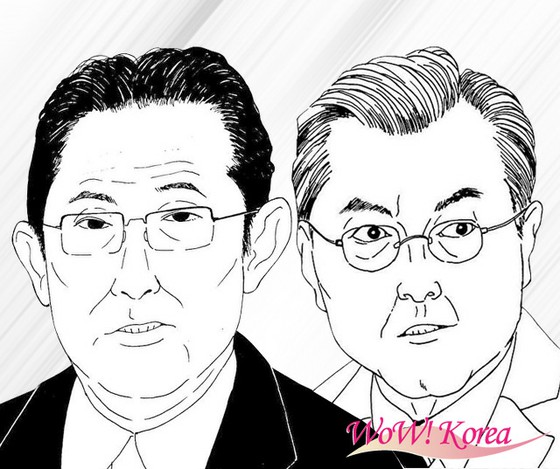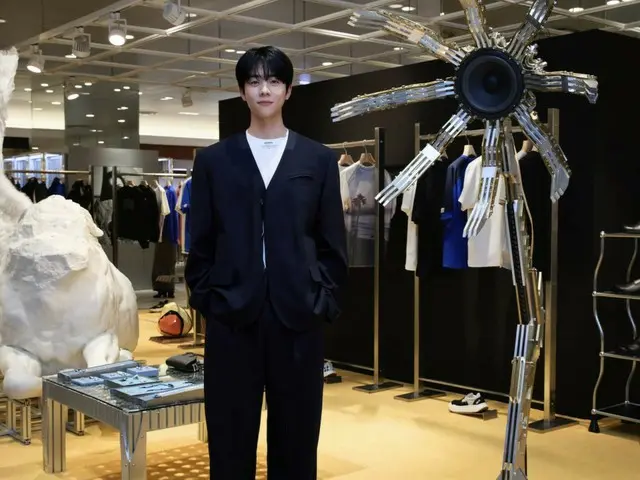 |
In a letter, President Moon said, "Let's work together for the development of Korea-Japan relations." The Seoul newspaper in South Korea said, "It can be seen that the two countries have shown their intention to continue their dialogue efforts," while the two countries have not found a solution due to the former recruitment issue and the comfort women issue.
Park Kyung-mi, a spokesman for the South Korean presidential office, said that President Moon had sent a letter to Prime Minister Kishida. "We look forward to working together to resolve global issues such as the COVID-19 virus and climate change issues."
On the 4th of last month, when Prime Minister Kishida was elected the 100th Prime Minister, President Moon sent a letter to congratulate him on his inauguration. In addition, the two leaders held a telephone talk on the 15th of last month, but Prime Minister Kishida requested a positive response from the South Korean side due to the former recruitment problem. In response, President Moon said, "The legal interpretations of both sides are different issues," and the debate was reported to have followed parallel lines.
According to a survey conducted last month by South Korean opinion poll company Realmeter on 500 people aged 18 and over throughout South Korea, the Japanese government will change its attitude first regarding future Japan-Korea relations following the inauguration of the Kishida Cabinet. 58.4% of the respondents answered that they should. On the other hand, only 29.1% of the respondents answered that "the Korean government needs to actively improve relations."
The face-to-face talks between the two leaders have not yet been realized. Earlier this month, the two leaders attended the "26th Conference of the Parties to the United Nations Climate Change Framework Convention (COP26)" summit in Glasgow, England, but the two did not meet.
Regarding this, Choi Jung-gon, the first secretary of the Korean Ministry of Foreign Affairs (equivalent to the Ministry of Foreign Affairs of Japan), said in a Korean radio program that appeared on the 3rd of this month, "Prime Minister Kishida visited the UK after the (House of Representatives) election, and President Moon said. I had to visit Hungary (after COP26) and I didn't have the time. "
However, South Korean media pointed out that Prime Minister Kishida had a brief meeting with US President Joe Biden. It was also reported by some media that "the Korea-Japan summit meeting was unexploded" and "there are many views that Japan has a low priority on Korea-Japan relations." On the other hand, Cheong Wa Dae's chief secretary for national communication, Park Soo-hyun, said in a Korean TV program that he appeared on the 3rd, he understood that the media was paying attention to the realization of the Japan-Korea summit meeting, but he was "unexploded." I was uncomfortable with being reported using the expression.
South Korean media say that the realization of the Japan-Korea summit meeting is uncertain until the end of President Moon's term by May next year. Yonhap News Agency analyzed that the fact that parallel lines continue due to the former recruitment problem and the comfort women issue, which are concerns of both countries, is "the essential cause of 'passing'", and "in a situation where the time is not ripe. Even if we meet forcibly, we cannot expect any results."
In the House of Representatives election at the end of last month, the Liberal Democratic Party, chaired by Prime Minister Kishida, won an exclusive majority with 261 seats. Mr. Kishida was elected as the 101st prime minister in the plenary session of both houses of the Diet on the 10th, and the second Kishida cabinet was inaugurated.
Choi, the first secretary of the Ministry of Foreign Affairs, said, "I hope that Japan's political situation will be stable and that the prime minister who has gained strength in Japan will sit in front of us. We believe that Prime Minister Kishida will do so."
However, it can only be said that such various analyzes and expectations of South Korea have not grasped the cause of the problem and its essence, or closed their eyes and ears.
The "short-term cause" of the chilling relationship between South Korea and Japan is that the Mun administration is not keeping its promises between South Korea and Japan. I'm sorry for the mistake of the previous administration, but if the company that unilaterally violates promises and contracts with other companies while saying that the predecessor president is bad even if the president has changed, that expectation is Is strange.
The "long-term cause" of the chilling relationship between Japan and South Korea is the "difference in historical perception" between South Korea and Japan.
A rough look at the history of both countries from South Korea is that the Japanese empire invaded the Korean Peninsula, an independent ethnic nation that had maintained half a million years, and lived peacefully and freely in white robes, assassinated the queen, and the king's. On the contrary, he bought pro-Japanese ministers and made them sign the colonization treaty without permission. Therefore, the rule of the peninsula is all illegal. Japan seized land and rice and enslaved the people. Japan slaughtered the peaceful independence movement with a gun sword, forced a Japanese name, and launched an aggression war against Asia. Many were mobilized, abducted, and recruited to use the girl as a comfort woman.
A rough look at the same history from Japan is that "Japan helped establish the Korean Empire by liberating the Korean Peninsula, where half of the people were nobi and belonged to the Qing dynasty, in the Sino-Japanese War. However, more than 10 years have passed. He could not rule properly and ruled the peninsula by concluding a treaty with the emperor. Modernized land management and family registration system, built a fertilizer factory, increased rice production and exported it to Japan, and increased income. Administration, justice, economy, We created all kinds of social infrastructure such as education, hygiene, medical care, water supply, railways, roads, power generation, and industrial facilities using the taxes of the Japanese people. During the war, the comfort women system was legal, and comfort women and others. Earned more than an officer. At the time of the normalization of diplomatic relations between Japan and South Korea in 1965, he tried to compensate the individual for the recruitment workers who were damaged by the turmoil at the end of the war, but left it to the Korean government. I was so strongly told that I did it."
The difference in historical perceptions between South Korea and Japan regarding the same thing has emerged as a result of "the Japanese government should change its attitude first" in the current opinion polls in South Korea. Unless this difference in perception is filled, the friendship between Japan and South Korea will be nothing more than a "building on the sand" even if it temporarily improves.
First, the Moon administration unilaterally declares that it will keep its promise, and discussions on problem solving will begin. Needless to say, reducing the difference in historical perception between Japan and South Korea is an important key to the safety and prosperity of future generations of South Korea and Japan.
2021/11/22 21:09 KST

![[Airport Photos] "Stray Kids" departs for New York](/img/topic/23/116466/248645_640W.webp)
